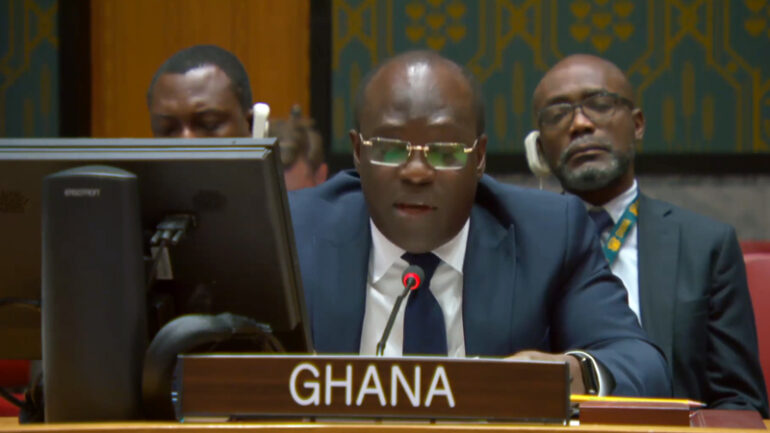Situation in the Middle East including the Palestinian Question-Middle-East Peace Process

Mr. President,
Let me begin by thanking Mr. Tedros Adhanom Ghebreyesus, Director-General of the World Health Organization and Mr. Marwan Jilani, Director General of the Palestine Red Crescent for their insightful but sobering briefings to the Council.
As we have followed closely the unfolding events that have provoked this meeting, we continue to be distressed by the situation in the Middle East, and specifically, in the Gaza Strip, the West Bank and in East Jerusalem.
The reported high number of children killed as well as the continued holding of many as hostages is deeply distressing. Besides the many deaths, 92 UNRWA staff have also been killed since the start of the war, which according to the UN is on record as the highest number in any conflict. The high intensity of casualties in the ongoing conflict should compel urgent action on the part of this Council to act to prevent the death of civilians and humanitarian workers.
Unlike many other conflicts in the Middle East and elsewhere, the inability of the Council to reach a consensus on how to get the parties to end the hostilities has affected the ability of the United Nations and other humanitarian actors to effectively undertake the delivery of humanitarian aid, protect civilians, and ensure adherence to international law.
We therefore hope that the Council can unite around a common approach to abate the hostilities, and bring the warring parties to the negotiating table for a peaceful resolution of the month-old war.
Mr. President,
Ghana notes the intention to allow a daily four-hour humanitarian pause in the fighting in northern Gaza to be announced three hours before the pause begins each day. We believe more can be done and more should be done. We must create urgent conditions for safe humanitarian corridors, for rescue and recovery operations and safe passage for the wounded, sick children, pregnant women, and caregivers in conformity with international humanitarian law.
Mr. President,
War no matter the cause must be done in compliance with international law. Civilian and civilian infrastructure, including the hospitals should be avoided as part of this conflict – either to shelter militants or to attack them. Water and fuel must be supplied and not hindered.
We reiterate our call on all countries that have a moderating influence over the parties to intensify efforts aimed at stopping the fighting and securing the release of all Israeli and foreign captives. We reiterate our call on the Hamas militia to heed the demand of the international community for the immediate and unconditional release of all captured civilians. Holding innocent civilian populations as captives is wrong and unacceptable regardless of the motives.
Mr. President,
The economic cost of not acting to stop the war is not lost on us. We are concerned by an assessment report released by the UNDP and the U.N. Economic and Social Commission for West Asia which states that at least 45% of all housing in the Gaza strip have been damaged or destroyed by Israeli bombardment. A month of war and Israel’s near total siege of Gaza, the gross domestic product shrank 4% in the West Bank and Gaza in the war’s first month, sending over 400,000 people into poverty, an economic impact unseen in the conflicts in Syria and Ukraine, or any previous Israel-Hamas conflict. The consequences of the economic devastation on top of the destruction of infrastructure could be great unless we act now.
Mr. President,
In conclusion, we appeal for the Council to be guided by the dire situation on the ground and the desire by the global community to end the ongoing war, which has resulted in close to 12,000 human casualties on both sides and brought immense suffering to children who constitute over 40% of the fatalities, the women and the aged who are the most vulnerable in Gaza. Our conduct and deliberations must reflect the expectations of helping the parties to end the ongoing hostilities.
We began this meeting with a minute silence. That observance should galvanize us to silence the sound of guns, rockets and missiles that have dominated the land of Israel and Palestine.
I thank you.
